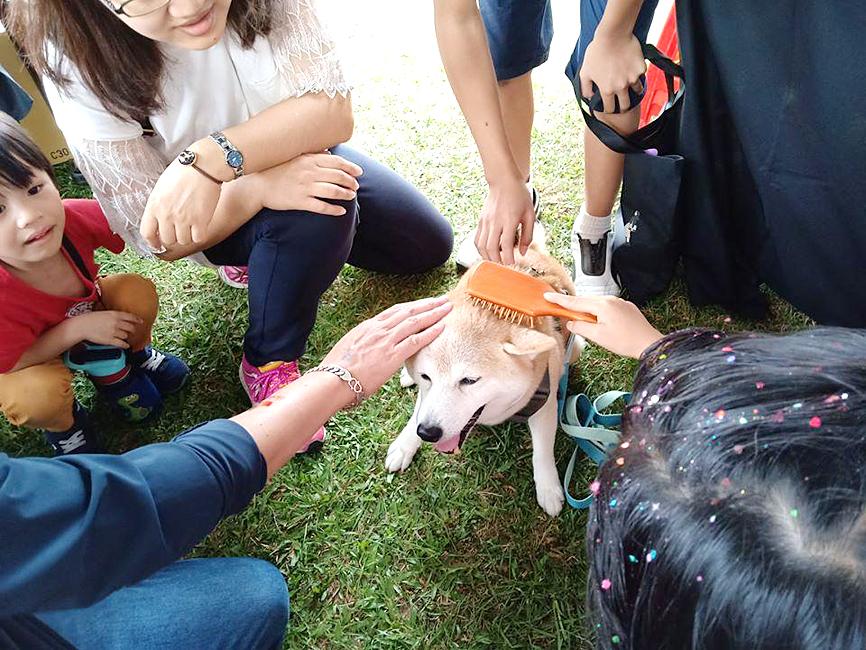In Taiwan, there is a group of doctors that cannot speak, but has helped countless children and old people heal, performing therapies that humans cannot offer, and these doctors can be referred to as “Dr dog,” Formosa Animal-Assisted Activity and Therapy Association chairman Collier Chang (張泮崇) said.
More than 500 “dog doctors” have been trained over the past two decades to provide animal-assisted therapies for people receiving rehabilitative treatment, including children and elderly people.
Speaking of Shirley Chen (陳秀宜), the founder of the association, Chang said: “Chen used to volunteer at an animal hospital overseas, where she saw dog doctors for the first time.”

Photo courtesy of Taiwan Dr. Dog Association
“Chen then introduced the training system for dog doctors in Taiwan with assistance from the Animals Asia Foundation, and founded the association in 2001,” he added.
Concerned with the rising number of abandoned dogs in Taiwan, Chen also included stray dogs in her training program, giving the animals a second chance to foster a close relationship with humans, he said.
The dog doctors’ services range from accompanying people in their everyday life to rehabilitation therapies, with services offered mainly in schools, medical institutions and care centers, said Teng Hui-chin (鄧惠津), a trainer at the association.
Being treated by a dog doctor has clear therapeutic effects, as some bed-ridden people said their mood improves when being with a therapy dog, and they would always look forward to sessions with their four-legged friends, she said.
Although some children in special education schools were at first reluctant to approach the dogs, they quickly adapted and felt comfortable, Teng said.
A woman with terminal cancer and a prognosis of only eight months to live has carried on for more than seven years and is still frequently seeing her dog doctor, she said.
Some special education teachers incorporate dog doctors into their teaching plans, boosting their students’ motivation to learn, Teng said.
For example, teachers might encourage speaking-impaired students to say the names of the dogs, or to speak to the animals, before and while they are petting the dogs, she added.
Caretakers, social workers and occupational therapists also include the dog doctors in their therapies, she said, adding that patients would comb or pet the dogs, or take them out for walks or play fetch.
Although therapies largely rely on the dog doctors’ abilities, their owners are equally important during training and therapy, she said, adding that owners facilitate interactions between dogs and humans, and their presence motivates the dogs to do their best.
The process of becoming a dog doctor can be strenuous. Before dogs can be enrolled in the three-level training courses, their aptitude and health have to be assessed. Each level of the course requires six weeks of exercises, that demand the dogs’ full attention.
Only then would the dogs be allowed to intern at therapy facilities, and only if a dog has gained enough experience, can it join the ranks of certified dog doctors, she said, adding that annual refresher courses must also be completed.
The training is not exclusive to dogs preparing for a therapeutic career, as owners who hope to learn more about their dogs’ behaviors are welcome to enroll, too, she said.

Taiwanese can file complaints with the Tourism Administration to report travel agencies if their activities caused termination of a person’s citizenship, Mainland Affairs Council Minister Chiu Chui-cheng (邱垂正) said yesterday, after a podcaster highlighted a case in which a person’s citizenship was canceled for receiving a single-use Chinese passport to enter Russia. The council is aware of incidents in which people who signed up through Chinese travel agencies for tours of Russia were told they could obtain Russian visas and fast-track border clearance, Chiu told reporters on the sidelines of an event in Taipei. However, the travel agencies actually applied

Japanese footwear brand Onitsuka Tiger today issued a public apology and said it has suspended an employee amid allegations that the staff member discriminated against a Vietnamese customer at its Taipei 101 store. Posting on the social media platform Threads yesterday, a user said that an employee at the store said that “those shoes are very expensive” when her friend, who is a migrant worker from Vietnam, asked for assistance. The employee then ignored her until she asked again, to which she replied: "We don't have a size 37." The post had amassed nearly 26,000 likes and 916 comments as of this

New measures aimed at making Taiwan more attractive to foreign professionals came into effect this month, the National Development Council said yesterday. Among the changes, international students at Taiwanese universities would be able to work in Taiwan without a work permit in the two years after they graduate, explainer materials provided by the council said. In addition, foreign nationals who graduated from one of the world’s top 200 universities within the past five years can also apply for a two-year open work permit. Previously, those graduates would have needed to apply for a work permit using point-based criteria or have a Taiwanese company

The Shilin District Prosecutors’ Office yesterday indicted two Taiwanese and issued a wanted notice for Pete Liu (劉作虎), founder of Shenzhen-based smartphone manufacturer OnePlus Technology Co (萬普拉斯科技), for allegedly contravening the Act Governing Relations Between the People of the Taiwan Area and the Mainland Area (臺灣地區與大陸地區人民關係條例) by poaching 70 engineers in Taiwan. Liu allegedly traveled to Taiwan at the end of 2014 and met with a Taiwanese man surnamed Lin (林) to discuss establishing a mobile software research and development (R&D) team in Taiwan, prosecutors said. Without approval from the government, Lin, following Liu’s instructions, recruited more than 70 software